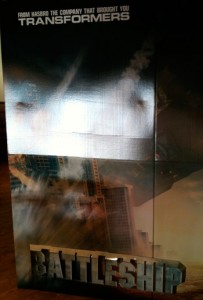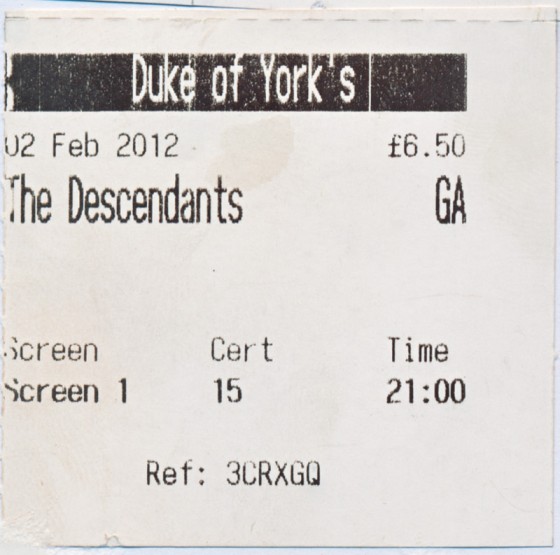
The Death of Death In Cinema: a Rebirth. Part Two.
My hatred of trailers is well documented. By me, but still. The fact they that ruin good movies is par for the course, and I swear each time to wait outside the lobby until they are over, even though I know my need to complain about something here will override this impulse every time. That and the melting ice cream. It doesn’t taste the same unless you’re watching something!

In choosing movies, we can’t go by stars, directors (see below), and certainly not critics, who are as good as picking films as stock brokers are at picking stocks (if you read this, you’ll understand why the Nobel committee will also award me the prize for economics for my work in the Rotten Tomatoes meter. Whether or not it’s after the peace prize I leave up to them. That’s my peaceful nature for you. So after, I guess).
Now people say that you can't talk about ethics when talking about film, and I would in turn say that those people aren't so much wrong as they are evil.
As a method for choosing films trailers fail as well as they simply give everything away. Though as you’re about to find out, it’s totally okay when I do it. But what about the rare instances when trailers just lie? I’m not talking about the obvious lie, like when they show all the interesting parts, which creates the illusion that the film will be 9 parts good to 2 parts crap, and in so doing, spoil the good parts and the dilution ratio, leaving you with 0 parts good, and 283 parts crap. I’m also getting it in chemistry, apparently. So I’m not talking about the commonplace lie, but the fairly rare Marketing-Gone-Mad trailer, where some studio is stuck with an art movie, and they want to get their numbers up, so to speak. In the case of Exotica, they cut a trailer make it look like a stripper thriller, and in the case of The Grey they cut it to look like Mr. Liam Neeson kicking some wolf ass.
The problem, as is also the case with you, is me. They’re making trailers that are preventing me from seeing the movie. If I see a trailer about strippers, I’m going to think of Striptease, and pass out. The blood rushed to my…feet to run away as fast as possible, ironically causing me not to run away. Which must explain why I went ahead and saw Exotica, which is an exceptionally complex film about grief and has almost no school girl strippers in it at all. The fact that I still liked it after that last sentence proves my point; it’s Mr. Atom Egoyen’s most coherent and complete work, and he’s pretty good as his job. I was likewise disinclined to see The Grey, which violated the Road Warrior rule of doggies (incidentally the prospect of seeing the film was not helped by Mr. Joe Carnahan’s boneheaded move to have the actors eat real wolf meat. I suspect this kind of crap is what keeps directors thinking that they ‘make’ films. But we’ll get to that). How did I know to see it? Magic; there must have been something that mystically leaked through the trailer metaconsciousness. Also boredom. Jack and Jill wasn’t coming out for two weeks.
Two weeks.


So what is The Grey about? It’s not about survival, or even killing wolves, despite PETA’s equally boneheaded protests to the contrary (and if anyone calls me anti-animal, I’m more than willing to feed their children to wolves to prove that I’m not), this is not a film or a character that hates wolves. See the film that you’re protesting. You never know; it could be about Jesus having sex. With butterflies.
First of all, only two wolves die, and the first is early on, where Mr. Neeson shoots it to protect the pipeline workers, and compassionately spends a moment with it, hand on its chest, as it breaths its last. I would have said ‘spoiler alert’ but that warning is about as visible to your brain as the speed limit sign in my village. In fact, by not saying it, I give you the opportunity to blame me and not yourself, which makes me a vast improvement over the government. I mean, they’re just passing laws to get off the hook. Don’t blame me for your neighbor’s behavior; I put the murder statute in all caps with asterisks.
Moments after the above, the plane crashes (and this is a really nice scene engaged in the interfilm tension problem. Ever since Alive, Fearless, and the surprisingly ignored Final Destination [no, not 2, 3 or 5; 1 and 3. Duh]), directors have had to up the ante in regards to visualizing the absolute terror with which we human travelers imbue the world’s safest form of transportation. Instead of more people sucked out of the fuselage, or physics bending planes-in-half-that-still-fly via Lost, this film provides us with less: the plane turbulence gets worse and worse and…we cut to 20 minutes later, and everyone’s asleep. When it does crash, it’s quick, and finishes with the striking image of Mr. Neeson’s head as the snowy background approaches. The point of interfilm tension is that you have to recognize not only what works for the film in relation to the real world, or the film itself, but what we’ve seen in other films. And this one did), the characters did something very suprising: they told me it would have been easier just to make such a large parenthetical its own paragraph. I ignored them.
They also did something else which I’m fairly sure I’ve never seen before. An injured character asks Mr. Neeson am I going to be all right, and before I could think wouldn’t it be cool if for the first time in film history he said, ‘No. You’re going to die,’ that’s exactly what he did. Instead of the traditional ‘You’re going to be just fine, and death doesn’t exist except in movies’, this film suddenly transforms into a film about dying, and how different characters approach it, and it’s a positively – in both senses of the word – Unamerican film on the subject. Metaphysical films get a bad, but totally justified rap because they all generally suck. The Grey shows how metaphysical films need to be totally grounded in the real, like trying to survive in the wilderness real. When you start to go all Reloaded and Revolutions, you get the faux metaphysics of Mr. JJ Abrams and Mr. Christopher Nolan, with the convenient of cop-out of maybe it was real, and maybe it wasn’t. But it was. Or was it? Yes, in the sense that we are answering the second negative question in the affirmative. Or are we?
Ugh.
Upon finishing the film, during which I cried three times (this is not totally that rare, but the film earns them), we reach the final shot, Mr. Neeson’s face, and the perfect expression of ragged pride, that it doesn’t matter if he lives: only that he fights. It is rare thing when I think that should be the final shot and it is, so I asked myself, or, more accurately, imdB: who is this Mr. Joe Carnahan? Upon learning, I was surprised. Not because a terrible filmmaker had made a great film; I was surprised because despite the fact that I won’t shut up about how directors are not responsible for films, my fingers typing into the phone were telling me that I still had some residual belief in the auteur theory.
The Grey
Profits!
Losses!
$20.00
The auteur theory, at least according to my unconscious, states that directors are responsible for the final product. My conscious mind tells me that this theory is about as useful as ‘From the toy company that brought you Transformers.‘
The societé theory (that’s ‘corporation’ in French) is actually more valid from a predictive point of view, since 1) Battleship and Transformers will be exactly same film in every way and 2) I will be powerless to stop myself from seeing them. By the way, this theory has actually been argued for real, and pretty persuasively; how else to explain the mess of studio filmmaking creating something like Casablanca? We are unable to accept the societé theory because we need a more concrete way to imagine the infinite of number of events that a bunch of people fighting, fucking, agreeing, smoldering with rage, telling jokes, working 22 hour days, wondering why the quality of the work seems like it’s made by people who were really tired, and haggling with hookers so much that you forget to have sex that results, accidently really, in a movie.
But the biggest argument against the auteur theory is Mr. Carnahan himself. He’s made some terrible, terrible films, and one great one. They are furthermore bafflingly dissimilar, including Killers Are Nice As Long As We See Them in Slow Motion, (released in the US as Smokin’ Aces, and in France as That Entorage Guy Does Coke!), the bland Narc, and unwatchable The A-Team (I mean that literally, actually. I never saw it. Don’t blame me. Blame Orange). And still you believe that the director is responsible for the film, instead of the sheer random chance that keeps us alive from moment to moment. Worse still, I believe it, having used the word ‘made’ instead of ‘mayde’ or ‘nothinged’. Giving credit to one person instead of recognizing the incredibly delicate social complexity of the process: I mean, what would happen if we ran a country like that?
I’ve explained The Author Theory before, but I will restate: in the mess of people that contribute to a film, I believe in the writer as the one most responsible, around 7% responsible to be exact. And now I’m going to prove it empirically. As in any scientific inquiry, we need a mass of data to rule out coincidence and apocrypha. Thus, I will add one more film to our dataset, making a total of two, which is twice as many as one. If I added one more after that, it would only be 50% more, and one after that 33% more, so technically one more film is the most I can add. Ah, what you don’t know about what goes on in the social sciences. Anyway, the film I add is the reprehensible The Descendants, which also conveniently proves 2011 is the worst year in cinema history, which in turn proves that I’m right once again, which in turn bolsters the theory.
That’s why it’s called social science.


Now that 2011 is on the table and not beating us over the head with its ineptitude, we can dissect as we need to. And though I’d have preferred to do it while it was still alive, we can at least say that 2011, for all its faults, had even more faults than we initially thought. The Descendants is a film of its time, or at least its arbitrarily defined eight month period (look, the 80s was only a 4 year decade, and there’s no way I’m counting Drive Angry 3D as a 2011 film). And I’ve talked about the Let’s Give Our Sociopath A Hug films, but in the case of The Descendants, that would be diagnostically inaccurate. It’s a Let’s Give Our Narcissist Some Attention film.
Voice over narration is always a risk, more so when it’s a computer generated composite of test screening cards, and even more so when you force me to paraphrase: ‘Hi, I’m Mr. George Clooney,’ I’m 90% sure it began and then continued, ‘I’m super rich from all the land my ancestors stole from the Hawaiians. I don’t like making hard decisions, so we’ll just have the ending be that I postpone the one actual decision I do have to make. What a life-affirming moment!, I say, having unknowingly reached the tragic point when it’s the characters and not the filmmakers who decide whether or not something is a tragic. Additionally, I’ve become so entitled, what with all my stuff, that the thing that really bothers me about my wife’s fatal coma is that she had an affair. What was she thinking? Didn’t she just hear how great I was telling the audience I was? God, it’s almost like she’s incapacitated is some medical way.’
Keeping the paradise metaphor alive, as the film constantly does, this is a story that wants to be about how having everything doesn’t give you happiness, but comes across instead as the story of how having everything entitles you to whine about how you have everything. Isn’t there more, it seems to ask, than everything? It is a dispositively – in a completely incorrect use of the term ‘dispositively’, but I needed a double inversion – American film on the subject, the whimper of dying empire, complete with the nods from the academy to validate it.
The Descendants was nothinged by Mr. Alexander Payne, who was also credited as the director on Election, which besides being a vastly superior film, was actually a satire directed at the same personalities that we are now supposed to nod and take seriously, or rather, directed at the personalities that make films like The Descendents. Following the author theory, it is important to remember that Mr. Payne adapts novels, whose authors determine the quality, wit, story, characters, and yep, even the ethics of the resultant film.
Now people say that you can’t talk about ethics when talking about film, and I would in turn say that those people aren’t so much wrong as they are evil. Somehow, as dispassionate analysts, we are supposed to separate the art from the message, with the typical example of Ms. Leni Reifenstahl, who is ostensibly a great filmmaker with poor ethical taste. The few of us who have actually seen her films know that she is in fact a terrible filmmaker whose poor ethical taste dragged her films from ash heap of history to the ash heap of basic cable.
Well made unethical films exist, and are both entertaining and irritating at the same time. I would, and have, point(ed) to Children of Men or Forrest Gump (or, Bill and Ted’s Excellent Adventure actually made by Bill and Ted) as examples of such films. I should have a name for this genre. The Good Evil Film? The Good Evil 2: Ambiguous by Dawn Film? The Descendants, utterly lacking in wit, insight or pace, is simply an Bad Evil film (which would be a better name for a film then a genre: The Bad Evil. I can’t wait. In fact, I’m already pissed off how much the trailer gave away); its lack of even a halfway recognizable moral core is a major part of why it fails. It’s fine that its populated with a bunch of white people live in a place where somebody stole the land from somebody else; everyone on earth lives there. It’s even fine that the characters have no idea that the fact they’ve been land stealing for 200 years straight might be part of the reason that things are starting to be slightly less good. Like all things that are threatening to pull apart the social fabric of everyday existence, this is potentially funny stuff, not, as the film seems to think, profound life lessons.
Election, recognized this, and was funny because of and not despite this recognition. Its moral rage is what makes it so watchable, the cries of an optimistic pretending to be a pessimist trapped in a world built by a bunch of people doing the same kind of pretending. Ethics are irrevocably part of the filmgoing experience, slightly less important than lighting or casting, but way, way more important than the director. The Grey is not a comedy, but the fact that it contains a smidgen of profundity about the acceptance of, and the struggle against, death helps be a better film about Mr. Neeson kicking wolf ass, or, as it happens, kicking nihilistic mortality ass. If you want to make it a comedy, find some people who have everything and drop them in the arctic. Don’t like your perfect life? Here’s some wolves, fucko. And after 90 minutes of having them argue over which color of microfleece goes with their PETA wolf protest app, the wolves hug them. With their giant teeth.
Spoiler alert.
The Descendants
Profits!
Losses!
-$14.50
The Lonely Comments Section

 [logo]
[logo]


